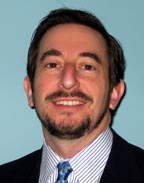|
Web Exclusives: Alumni Spotlight
April 21, 2004: Save
the Bay
While David Lewis ’83 was growing up in Palo Alto, California, the San Francisco Bay was not a place to go swimming. “It was a dump, a sewer,” he says. Little did he know that, years later, it would be his job to clean it up. As executive director of Save the Bay, a conservation group founded in 1961, Lewis has become one of the most prominent voices in the Bay Area calling for the protection and restoration of its greatest natural resource. The organization, with roughly 10,000 dues paying members, recently won a major battle against one of the region’s most controversial public works projects — a plan by San Francisco International Airport to expand its runways by filling in 1,200 acres of the bay. In 2001, Save The Bay sponsored and passed a ballot initiative amending the San Francisco city charter to require voter approval of any bay landfill project over 100 acres. Citing a lack of popular support, the airport shelved the expansion project in May 2003. Lewis came to Save The Bay in 1998, but it wasn’t the first time in his career he had fought for the public interest. His senior thesis on the 1980s nuclear freeze movement helped him land a job at Friends of the Earth, a nonprofit group in Washington, D.C., lobbying for disarmament. Later, he joined Physicians for Social Responsibility, another arms-control group, before becoming the senior defense aide to U.S. Senator Carl Levin, from 1991-96. In 1996, Lewis was hired as the chief operations officer of the League of Conservation Voters. Two years later he moved back to the Bay area to serve at the helm of Save The Bay. “It felt like a dream job,” Lewis says. Lewis inherited an organization with a great reputation and mission, but one he says was low-tech and “under performing.” He began a more aggressive fundraising campaign, overhauled the group’s Web site, and expanded volunteer opportunities and educational trips for students. The effects are noticeable. Since Lewis joined the group, membership has swelled by 15 percent, the budget has doubled to about $2 million per year in 2002. Though he is reluctant to take credit, the political success of amending the city charter in 2001 and of stopping the airport expansion in 2003 was thanks in no small part to Lewis’s own experience as a lobbyist at the Capitol. Today, with the runway expansion plans shelved for the foreseeable future, Lewis and his organization are not resting on their laurels. More than 7 million people live and work around the bay, and every heavy rainfall flushes motor-oil, agricultural pesticides, copper from brake pad linings, trash, and other pollution on city streets into its waters. This “nonpoint source” pollution will only get worse, as the Bay Area’s population is expected to double by the year 2025. To encourage awareness of bay-friendly practices and policies, Lewis’s group organizes thousands of educational canoe trips for students each year, and leads teams of volunteers working on habitat restoration of marshlands, which serve not only as ecological oases but also as a natural filter for storm runoff. For his efforts at Save The Bay, Lewis was awarded the Princeton Club of Northern California’s Public Service Award in 2000, and was appointed as an environmental advisor to the transition team of San Francisco’s new mayor, Gavin Newsom, in December 2003. Lewis and his wife, Julia, live with their two daughters in Kensington,
a township in the hills above Berkeley, and from their bedroom enjoy,
appropriately, a sweeping view of the bay. By Justin Nyberg ’01
Justin Nyberg ’01 is a reporter in San Francisco.
Home Current
Issue
Web Exclusives: Headlines - PawPlus - Features Tooke's Take - Varsity Typewriter - Inky Dinky Do Raising Kate - On the Campus - Comparative Life - More... PAW Online Archives - Print Archives - Advertising Info - Reader Services Search the Site - Contact PAW Princeton University - Alumni Links - Alumni Council - Your Class Secretary |
||

